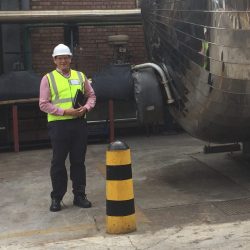COVID: Think outside of the box or risk being left behind
In this article series we ask leading energy management experts about the impact of coronavirus.
Alf Hartzenberg, South Africa
National Project Manager of the Industrial Energy Efficiency Project in South Africa

In South Africa, the government applied a very hard lockdown. So other than essential services, the industrial sector has been effectively closed. But that hasn’t stopped us. We have continued to engage those industry managers and personnel who are still available and are prepared to work with us. Energy profiling, industrial site scoping, contracting specialists to provide technical support, initiating loans or financing for energy efficiency projects as well as training and meetings have all continued virtually. This is critical. I’ve even challenged my team to make use of their mobile phone cameras and GoPros to conduct virtual assessments of industrial plants. In a way we are trying to do as much as we can to prepare for the resumption of business activities and the new normal we will be subjected to post COVID-19. We cannot afford to fall behind at this time.
We are entering a new normal. When staff, plant and energy managers finally get back to the office, they’ll need to think outside of the box. They’ll need to integrate safety measures with operational requirements in a way that won’t compromise business sustainability and energy performance. We cannot ignore this new burden, this new responsibility. COVID-19 doesn’t have to be an enemy, it can be an ally for innovation.
For example, this could be a time for industrial companies to embrace inevitable advances in technology. COVID-19 is going to accelerate digitalisation, and companies must jump on this if they intend to cut costs through process optimisation, automation and switching off vital machines when they aren’t in use. I can’t tell you how many times I have walked into industrial plants to see conveyors running with nothing on them, or motors and bandsaws turning for no reason.
Perhaps industries could consider starting with low-cost interventions. I strongly recommend that industries interrogate their refrigeration setpoints. So often I walk into a freezing empty chiller room,which could have easily been set to a standby temperature level. So often I walk through data centres that are two to three degrees colder than they need to be. Similarly, it is critical that manufacturers look at how they are using their motors. There are often plenty of opportunities to fit variable frequency drives, or simply slow downthe speed of a motor which can save incredible amounts of money and energy.
Finally, now is the time not just to maintain energy management expertise, but to expand on it. I think companies really need to take advantage of online training opportunities, such as those provided by our partners at the German Renewables Academy (RENAC) and the Southern African Energy Efficiency Confederation (SAEEC), to make sure that they stay ahead of the curve. In a way, COVID is providing the flexibility and time to upskill which wasn’t available previously. Companies need to exploit this opportunity to re-skill their operators and technicians, and to develop their managers into more effective and energy conscious teams of the future.
The Coronavirus (COVID-19) has resulted in mass production shutdowns and supply chain disruptions throughout South Africa due to port closures in China, causing global ripple effects across all economic sectors in a rare “twin supply-demand shock”. Despite being prevented from working on the factory floor during the COVID-19 outbreak, Alf and his team at UNIDO-South Africa are making use of their mobile phone cameras, GoPros and 3D high resolution cameras to remotely map industrial sites. This technology enables the viewer to zoom into detail such as a motor and equipment nameplate and allows reviews to detect operational nuances not identified on first view. Such tools enable UNIDO to continue operating remotely and may very well become the norm in future industrial energy efficiency assessments.
Learn more about UNIDO’s South Africa Industrial Energy Efficiency Project. The IEE Project in South Africa is funded by the Global Environment Facility, with co-funding through the South African Department of Trade, Industry and Competition (the dtic). The work is implemented by UNIDO and executed by the National Cleaner Production Centre South Africa (NCPC-SA – a programme of the dtic), and the Department of Mineral Resources and Energy through the South African National Energy Development Institute.
Innovation in a time of COVID. The COVID-19 pandemic will change the global industrial sector forever. In this article series we ask leading energy management experts about how the virus has affected their country’s industrial sectors and what businesses could be doing to prepare for an uncertain future.
